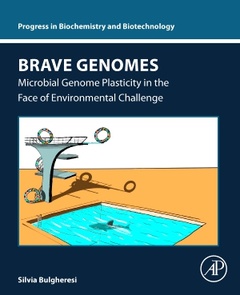Brave Genomes Microbial Genome Plasticity in the Face of Environmental Challenge Progress in Biochemistry and Biotechnology Series
Auteur : Bulgheresi Silvia

Among the environmentally sensitive sources of genome plasticity, the book treats tandem repeats, mutagenic break repair, transcription-associated mutagenesis and transposable elements. Additionally, it deals with epigenetic mechanisms such as DNA methylation and regulatory RNA-based systems. These not only regulate the activity of mobile DNA, they can also synergize with it. In closing, symbiosis and genetic noise are also discussed as possible sources of phenotypic plasticity.
Brave Genomes emphasizes the role of the environment in generating genotypic and phenotypic diversity. This emerges, in turn, as the most efficient response to challenging conditions.
2. DNA fun facts: how, when and where it may change a bit
3. Bacterial and archaeal DNA very fun facts: how, when and where it may change a lot
4. On top of the DNA and beyond
5. Biophyisical sources of phenotypic heterogeneity in bacteria
6. The microbes and the host epigenome (and vice versa)
Silvia Bulgheresi is Associate Professor in Environmental Cell Biology and independent researcher at the University of Vienna. Her research on the molecular mechanisms underlying symbiont growth, division and chromosome segregation challenged long-established bacterial cell biology tenets. Since 2008, she has been teaching environmental cell biology, microbial symbioses, as well as microbial genome plasticity to Bachelor, Master ad PhD students. It is in the effort of collecting the notes, thoughts and students’ questions that arose over two decades that this book was born.
- Compares environmentally sensitive genetic systems across the three kingdoms of life (bacteria, archaea, eukaryotes)
- Compares environmentally sensitive epigenetic systems across the three kingdoms of life
- Brings together insights of illustrious scientists including Josep Casadésus, Remus Dame, Cedric Feschotte, William Martin, Eva Jablonka, Eugen Koonin
- Microbial symbioses and genetic noise are also treated as potential sources of phenotypic plasticity and adaptability together with more traditional sources
- Familiarizes biologists with this discipline by using a colloquial style
Date de parution : 02-2025
Ouvrage de 220 p.
19x23.4 cm


